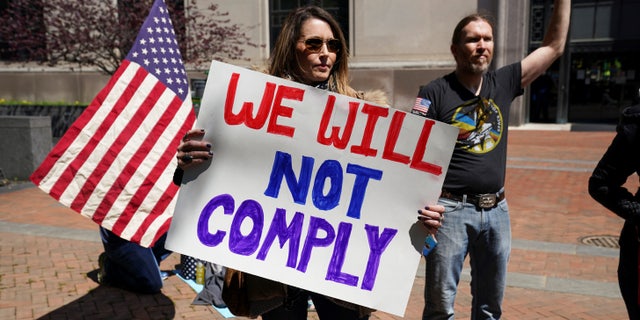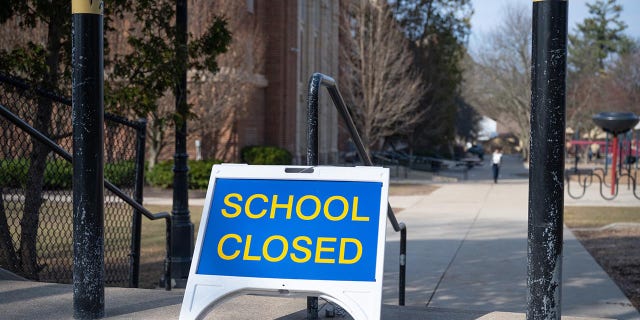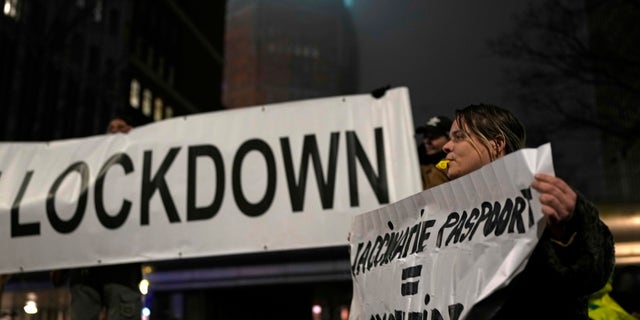A recent controversial Johns Hopkins meta-analysis reignites a discussion about the adverse consequences of lockdowns after finding they had no significant mortality benefit during the first wave of the 2020 pandemic in the United States and Europe, according to a recent report.
"We find no evidence that lockdowns, school closures, border closures and limiting gatherings have had a noticeable effect on COVID-19 mortality," said the authors of the study, which is not peer-reviewed and reflects the authors' views, not necessarily those of the university.
The study authors, however, did find closing nonessential businesses reduced COVID-19 mortality by 10.6%, which is likely most related to the closure of bars.
'SHOULD BE REJECTED OUT OF HAND': LOCKDOWNS ONLY REDUCED COVID DEATH RATE BY .2%, STUDY FINDS
"Our study shows the benefits [of lockdowns] — in terms of fewer deaths — are questionable and small," Jonas Herby, special advisor at the Center for Political Studies in Copenhagen, Denmark, told Fox News. Herby's research focuses on law and economics, and he is a co-author of the study.
The meta-analysis – a survey or study of previous studies – which Herby wrote along with two other prominent economists, noted lockdowns have had "devastating effects" as society weathers the unintended consequences.
"They have contributed to reducing economic activity, raising unemployment, reducing schooling, causing political unrest, contributing to domestic violence and undermining liberal democracy," the report noted.

A protestor carries a sign during a demonstration outside the Virginia State Capitol to protest Virginia's stay-at-home order and business closures in the wake of the COVID-19 outbreak in Richmond, Va., April 16, 2020. (REUTERS/Kevin Lamarque)
The research directly contradicts the most influential model for lockdowns led by epidemiologist Neil Ferguson, which was largely responsible for "driving the world’s response to COVID-19" that "jarred the U.S. and the U.K. to action," according to The Wall Street Journal.
Ferguson co-wrote a prominent paper in Nature published in June 2020 that estimated lockdowns in the spring of that year saved three million European lives. But the study excluded the research because it relied on modeling, according to multiple reports.
"This report on the effect of ‘lockdowns’ does not significantly advance our understanding of the relative effectiveness of the plethora of public health measures adopted by different countries to limit COVID-19 transmission," Ferguson posted on Science Media Centre, a United Kingdom liaison of information for science and health journalists.
Ferguson resigned his government post on the Scientific Advisory Group for Emergencies in May 2020 after breaking lockdown protocol himself when his lover, Antonia Staats, crossed London from her family home to visit him on at least two occasions while lockdown measures were imposed, according to the Guardian.
MAJOR MEDIA IGNORE STUDY FINDING COVID LOCKDOWNS INEFFECTIVE
The Johns Hopkins researchers acknowledged a limitation of the study was excluding certain studies like Ferguson’s to avoid biases, such as those brought on by "time-dependent factors" like seasonality. So papers that looked at early lockdowns such as in China, which suppressed COVID-19 to very low death rates, were also not included, according to a United Kingdom report.
Nevertheless, lockdowners are now weathering the aftershocks that persist after the lockdowns have been lifted, according to multiple reports.
"There are long-term health consequences from the virus, including long COVID, and there are long-term mental health impacts from the death due to COVID-19 of a parent, spouse, grandparent, caregiver," said Dr. Julie Vaishampayan, chair of the public health committee for the Infectious Diseases Society of America.
"There are long-term health impacts of the measures used to slow down the spread of this virus."
By the end of June 2020, the Centers for Disease Control and Prevention found that, due to COVID-19 concerns, approximately 41% of United States adults delayed or avoided medical care, including 12% who avoided urgent or emergency care and 32% who neglected routine care. Those findings noted a higher prevalence among people with multiple medical problems, Black and Hispanic adults, young adults and persons with disabilities, according to a past Morbidity and Mortality Weekly Report.
Even though most students are now back in school, many now struggle academically from the consequences of months of online learning, while some others opted to switch schools or even drop out, according to a recent New York Times report.

A "closed" sign in front of a public elementary school in Grand Rapids, Mich., in March 2020. (iStock)
The Times also noted that students continue to have persistent feelings of loneliness and anxiety with the sense that the system has failed them and created responsibilities that are not typically expected of them.
"Today’s kids will have to shoulder this burden along with diminished skills, thanks to the distance-learning disaster demanded by so many so-called experts in public health," said James Freeman, assistant editor of The Wall Street Journal's editorial page, a Fox News contributor and frequent host of "Deep Dive" on Fox Nation.
The New England Journal of Medicine reviewed the psychological impact of people in quarantine, finding "numerous emotional outcomes, including stress, depression, irritability, insomnia, fear, confusion, anger, frustration, boredom and stigma associated with quarantine, some of which persisted after the quarantine was lifted."

A protestor holds a banner during a small anti-COVID restriction demonstration in The Hague in the Netherlands, Saturday, Dec. 18, 2021. (AP Photo/Peter Dejong)
CLICK HERE TO GET THE FOX NEWS APP
"The president has been clear that we are not pushing lockdowns, we have not been pro-lockdown, that has not been his agenda," White House press secretary Jen Psaki said when asked about the Johns Hopkins paper at a recent press briefing.
"Most of the lockdowns actually happened under the previous president. What our objective has been is to convey we have the tools we need to keep our country open."
"We need strong, accurate data on all these long-term effects to best balance the response measures, ensuring the best possible outcome," Vaishampayan added.
Fox News' Paul Best contributed to this report.
COVID-19 - Latest - Google News
February 06, 2022 at 05:14AM
https://ift.tt/UHpFJA6
Johns Hopkins study reignites COVID lockdown debate - Fox News
COVID-19 - Latest - Google News
https://ift.tt/tfjhQKp

No comments:
Post a Comment